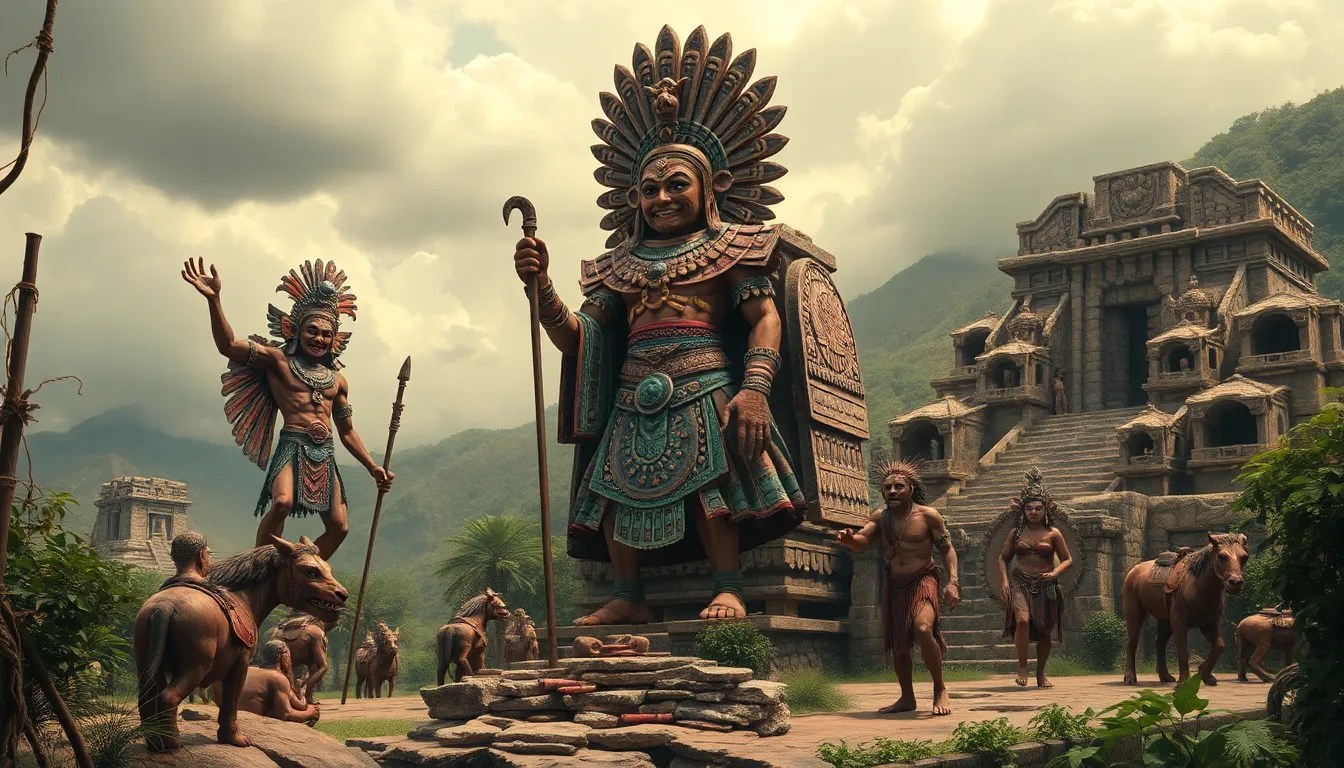The Role of Ancestors in Aztec Economic Practices
I. Introduction
The Aztec civilization, flourishing in central Mexico from the 14th to the 16th centuries, was a complex society known for its rich cultural, religious, and economic practices. At the core of Aztec culture was a profound respect for ancestors, which influenced various aspects of their daily lives, including agriculture, trade, and craftsmanship. This article explores the significant intertwining of ancestor worship and economic practices within Aztec society, illustrating how the veneration of ancestors shaped their economic landscape.
II. Understanding Ancestor Worship in Aztec Society
Ancestor worship, or the reverence for deceased relatives, held a pivotal role in Aztec society. It served as a vital link between the living and the dead, ensuring the continuity of family and community identity. The Aztecs believed that ancestors could influence the living’s fortunes and misfortunes.
- Definition and significance: Ancestor worship involved rituals and ceremonies to honor the deceased, acknowledging their contributions and seeking their guidance.
- Rituals and beliefs: Common practices included offerings of food, flowers, and incense, particularly during festivals like the Day of the Dead (Día de Muertos).
- Family and community identity: Ancestors were integral to the social fabric, reinforcing kinship ties and communal solidarity.
III. Ancestors and Agricultural Practices
The Aztecs believed that the fertility of the land was closely connected to the spirits of their ancestors. They conducted various rituals to invoke the blessings of these spirits during crucial agricultural cycles.
- Connection between ancestral spirits and land fertility: Ancestors were thought to protect and nurture the earth, ensuring bountiful harvests.
- Rituals during planting and harvest: Farmers would perform ceremonies, often involving offerings of maize, to honor their ancestors and seek their favor.
- Case studies: Festivals such as Tlalocan, dedicated to the rain god and associated with ancestral spirits, showcased the deep-seated belief in the connection between the past and agricultural success.
IV. Ancestors in Trade and Commerce
Trade and commerce were vital components of the Aztec economy, and the influence of ancestors permeated these practices as well. Merchants often sought the blessings of their forebears in their commercial endeavors.
- Influence on trade practices: Ancestors were regarded as protectors of trade routes, ensuring safe passage and successful transactions.
- Market rituals: Merchants would offer prayers and sacrifices to their ancestors before embarking on trading journeys, believing this would secure their success.
- Offerings by merchants: It was common for merchants to create altars in markets to honor their ancestors, reinforcing the connection between commerce and ancestral veneration.
V. Ancestors and Craftsmanship
Craftsmanship in Aztec society was deeply rooted in ancestral knowledge and traditions. The skills passed down through generations were often associated with specific lineages.
- Role of ancestral knowledge: Artisans relied on techniques and materials that had been honed by their forebears, ensuring the quality and authenticity of their crafts.
- Importance of lineage: Certain crafts were traditionally linked to specific families, enhancing their reputation and economic standing.
- Examples of crafts: Textiles, pottery, and metalwork often bore the signature styles of particular ancestral lines, reflecting their heritage and expertise.
VI. Ancestors in Social Hierarchies and Economic Status
In Aztec society, lineage played a crucial role in determining social hierarchies and economic status. The veneration of ancestors was intertwined with issues of power and wealth distribution.
- Influence of lineage: Noble ancestry often translated into greater economic opportunities, access to resources, and political power.
- Relationship between noble ancestry and economic power: The elite classes were expected to honor their ancestors through elaborate rituals, which also reinforced their social standing.
- Impact on wealth distribution: Ancestor veneration contributed to a system where resources were often allocated based on familial ties and ancestral connections.
VII. The Ritual Economy: Ancestors and Gift Exchange
The economy of the Aztecs was not solely transactional; it included rich rituals that incorporated gift-giving and ceremonial exchanges. Honoring ancestors through these practices strengthened economic ties within communities.
- Significance of gift-giving: Offering gifts to ancestors was seen as a means of maintaining their favor and ensuring prosperity.
- Ceremonial exchanges: Events like weddings and funerals often involved the exchange of gifts that acknowledged both the living and the dead.
- Examples of rituals: During the festival of Tlaxochimaco, gifts were exchanged, reinforcing community bonds while honoring ancestors.
VIII. Conclusion
The interconnection between ancestors and economic practices in Aztec culture is a testament to the profound impact of ancestor veneration on their daily lives. From agriculture to trade, craftsmanship, and social hierarchies, the influence of ancestors was omnipresent. Understanding these cultural practices provides valuable insights into historical economies and their complexities.
Today, the legacy of ancestor worship continues to resonate in various cultures around the world, reminding us of the importance of honoring our past and its influence on our present and future economic practices.



